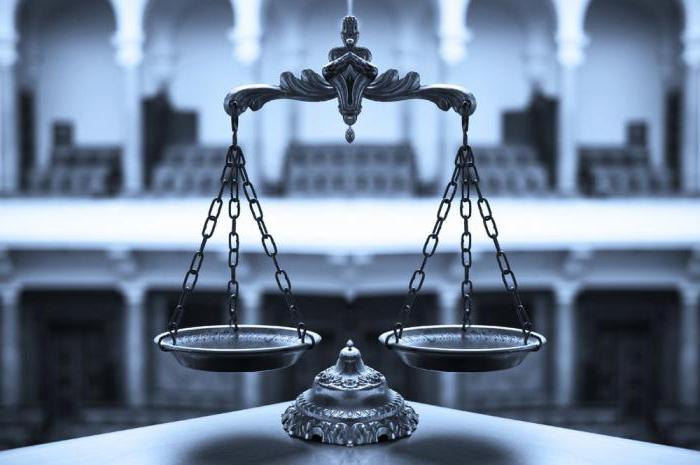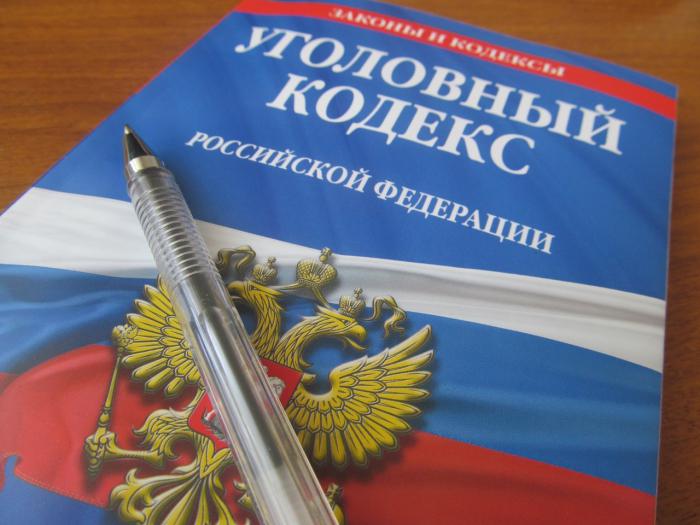In absolutely any litigation (arbitration, criminal, administrative, civil), there are many subtleties of a practical plan. By the way, among them there are many nuances of a legal nature. What is administrative prejudice in criminal law? In what cases does it occur? What is its significance directly for the completion of the trial? You can find answers to these and other equally interesting questions in the process of reading this article.

The concept of administrative prejudice
As it turned out, prejudice should be understood as the legal nuance of informal legislation. As a rule, only a few experts are dedicated to it. So, prejudice in the administrative process is considered by lawyers, judges, lawyers and so on. It is important to note that any person who is to take part in the trial needs to know basic information about it.
Prejudice is nothing more than a little-studied, but at the same time, complex legal phenomenon. Its definition, as a rule, is not endowed with an unambiguous understanding in relation to modern law and is not presented in the standards of a larger number of its branches.
Prejudice in administrative matters as a concept of legal nature appeared in Roman law. As you know, the latter, together with its legal categories, norms and terms, formed the legal basis of other states. In turn, the Latin language has become an instrument, as well as a source of the emergence of fundamentally new directions and concepts both in Russia and in European countries.

Latin origin
The term "administrative prejudice" came directly from the Latin word praejudicium. It is translated as a preliminary decision of the issue or a circumstance that fully allows us to judge the expected consequences. Praejudicium consists of two elements: praecedo - precede, go ahead; praeiudico - judge in advance tentatively. So, as a result of the synthesis of these components, the meaning of the modern term “administrative prejudice” is revealed.
It should be noted that criminal liability, as a fundamental institution of law, is a necessary tool for organizing a normal public life. It serves as a specific means of maintaining and protecting order in the circle of the most important relations of a social nature, which is outlined directly by legislative norms.
The only and main source of this category is the criminal law. It implies an exhaustive list of actions recognized as crimes. Thus, the criminal law is able to impose on citizens within the framework of regulatory relations a clearly identified range of responsibilities. The execution of the latter, one way or another, is reinforced by the possibility of using state coercion. It is necessary to add that when committing a crime, the mechanism of the relationship of criminal law begins to work, the main result of which is the implementation of the sanction.
In the process of constructing certain crimes in the Criminal Code of the Russian Federation, the legislator determined the implementation of the second offense immediately after imposing a penalty of an administrative nature for the first offense of a similar nature.This may include illegal opening of bank accounts outside the country or petty theft committed repeatedly.

The essence of administrative prejudice
The legal phenomenon presented above is defined by the name "administrative prejudice in criminal law." It is not surprising that for many years it has provoked controversy among scientists, which primarily concern the need for the situation under consideration in criminal law. Thus, in professional literature there is such a point of view that no administrative offense can be endowed with social danger, which is a specific criminal characteristic of a certain act. This fact is the reason that a certain number of offenses simply cannot mechanically develop into a fundamentally new quality - a crime.
Administrative prejudice in the criminal law of the Russian Federation, in accordance with the opinion of many domestic authors, consists in the fact that an action turns into a crime only when it can be carried out over an annual period of time immediately after the appointment of an administrative penalty for a similar violation. The explanation for such an interesting step by the legislator can be found in an effort to effectively establish a framework for the number of acts that do not reach the level of public danger, described by actual crimes, but are widespread, and therefore interfering with the adequate activities of state management bodies. On the other hand, the administrative prejudice of criminalization due to the complete absence of a legal basis due to the analysis of legal standards is not included in the criminal law.

Interest Ask
Is it advisable to adhere to the opinion that an administrative misconduct committed again immediately after the foreclosure for such a violation actually turns into a crime? This question should definitely be answered in the negative. Administrative prejudice in administrative law implies that the offense considered above is not able to form a fundamentally new quality. In other words, it cannot change the degree and direction of social danger. A similar provision directly proceeds from the content of the law, which states that the repeated action of an unlawful nature should be identical in terms of its nature to that for which certain measures had been previously used with respect to administrative sanctions.
In accordance with the views of domestic authors, an administrative offense, even realized for the second time, in its essence does not entail criminal liability. So, administrative prejudice in administrative law, of course, is preserved. However, this preservation does not speak of specific principles in the point of view of the legislator. Most likely, the question relates to inertia regarding its thought processes and the relevance of traditional stereotypes that have formed in criminal law only in recent years. Administrative offenses of a repeated nature, one way or another, should lead to more serious measures of influence, of course, within the framework of the relevant legal industry. That is why administrative prejudice in the criminal law of the Republic of Belarus and the Russian Federation should be consistently and completely excluded from current standards.

A fundamentally different opinion
It is important to note that in modern literature one can often find the opposite point of view presented in the previous chapter. So, in accordance with the opinion of S. MilyukovF., administrative prejudice in criminal law in conjunction with administrative allows to strengthen this union. On the one hand, it allows you to warn the offender at a very early stage in the development of his “career”. The latter, one way or another, is dangerous to society. On the other hand, crimes with administrative prejudice make it possible in a certain way to ensure the saving of criminal repression. The last of the presented procedures is advisable to produce, with the exception of damage to the interests of law-abiding citizens. What areas are relevant in terms of this issue?
Administrative prejudice in the Criminal Code of the Russian Federation is established in the field of trafficking in psychotropic substances, as well as their analogues; narcotic drugs; counteraction to various violations of environmental nature (for example, poaching); absolute safety on the road and so on.
Prejudice in Russian literature
Some Russian authors previously had their own opinions on the issue addressed in the article. So, they believed that administrative prejudice should in any case be used in the form of appropriate legal structures. The authors were firmly convinced that there were no significant obstacles of either theoretical or normative nature that would be able to exclude the use of this technique of legal technique. However, clearly developed accompanying administrative and legal norms should have served as an actual condition, one way or another. Then the administrative prejudice of decriminalization could be fully used in the criminal law.

First mention
It is interesting to note that the term considered in the article was first mentioned in 1994 in the 1960 Penal Code of the second part of article thirty of the “Fine”. It is necessary to add that the first mention did not give a definition to this concept and did not indicate the corresponding signs characterizing it.
Administrative prejudice (its other name is disciplinary) in terms of its essence has been disclosed immediately since the introduction of the new Criminal Code in 1999 in article thirty-two. It was noted there that in cases that are provided for through the Special Part of the Criminal Code, criminal liability for misconduct that is not socially dangerous on a large scale occurs when the act was carried out during the annual period immediately after a disciplinary or administrative penalty was imposed for such a violation.
Principles of Criminal Responsibility
The above General Part of the Criminal Code of 1999 establishes the principles for applying and prior to this use the establishment of criminal liability for certain crimes that do not pose a large-scale danger directly to society. Among these signs of such crimes, administrative (in other words, disciplinary) prejudice is especially distinguished.
According to the criminal law, the presented feature, one way or another, can be used by the legislator in case of criminal liability for certain unlawful acts that are not especially dangerous for the population (in accordance with the second part of Article twelfth of the Criminal Code of the Russian Federation). Then, when a person is held criminally liable, this attribute is assigned with criminal legal significance only during the annual period immediately after the disciplinary or administrative penalty is imposed on that person for such an offense.
Punishment under administrative prejudice
To begin with, it should be noted that the theoretical aspect of criminal law, according to researchers, speaks of the exclusion of broad assistance sanctions regarding the uniformity of judicial practice.Why? The fact is that they allow us to allow various kinds of punishments for similar misconduct, subject to similar information about the identity of the person directly guilty.
In addition, the researchers argue that it is the judges who face the most serious difficulties. Why? The fact is that the process of determining a specific punitive measure against the defendant, provided that in a sense there are no clear guidelines that are given directly by the legislator, is quite complicated.

Additional Information
As indicated, the Criminal Code contains thirty-six convictions for misconduct, in the design of which the legislator provided for administrative prejudice. Sanctions of these compounds imply the following types of punishments:
- Assignment to a person of public works - in twelve compositions.
- The penalty is thirty-three.
- Appointment of correctional work - in twenty structures.
- The purpose of the arrest is twenty-eight.
- Restriction of freedom of an unlawful person - in nineteen compositions.
- Depriving a person of the right to occupy specific positions (or promote certain types of activities) - in ten formulations.
- Imprisonment - in twelve compositions.
It must be added that in five sanctions, it is legislatively allowed to assign an additional sentence to the main type of punishment. As a rule, this is a deprivation of rights (the sixth paragraph of the list above). It can be seen from the list that in the process of constructing sanctions, first of all, the legislator put forward such punishments as arrest and a fine. It is important to note that absolutely all sanctions that are indicated in the misconduct are alternative with respect to certain character:
- Four cases have two main consequences.
- Seven cases involve three main sentences.
- Fifteen cases involve four sentences.
- Six cases involve five sentences.
- Two cases involve six sentences.
An exception to the above items is article 411 of the Criminal Code. Her sanction, one way or another, provides only the only form of punishment, namely imprisonment. Moreover, absolutely all types of consequences are endowed with a certain range directly between their lower and upper boundaries.
The opportunity to choose alternative punishments for deprivation of liberty for certain misconduct that does not pose a particular danger to society, provided by the law, in accordance with the point of view of the implementation of the objectives of the criminal type of responsibility in the case of a specific punishment, should give guidance to judicial practice one way or another not for similar punishments for similar misconduct, but for the maximum level of his individualization in the process of appointment. In accordance with the researchers' point of view, the main problem is not the breadth of the sanction itself, but the observance of the above principle, which consists in individualizing the punishment.
Thus, the following rule is relevant in legal practice today: the framework of sanctions against a criminal law should be considered optimal when the range of choice of the size and type of punitive measure that they allow allows the judge to maximize individualization of the sentence in the process of his appointment.